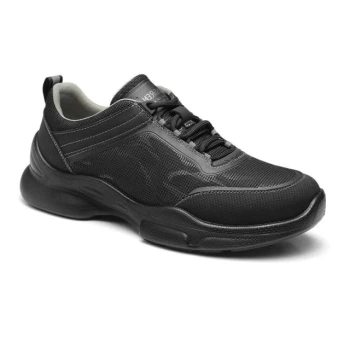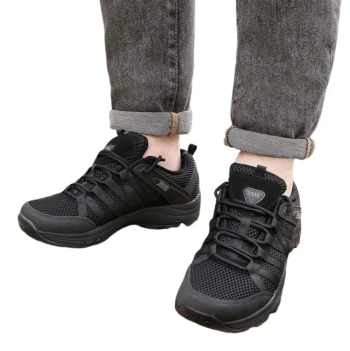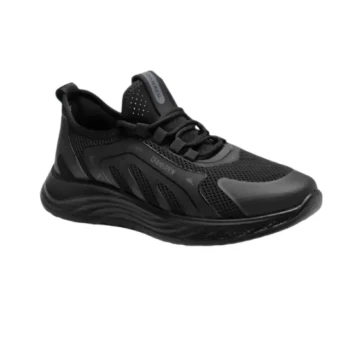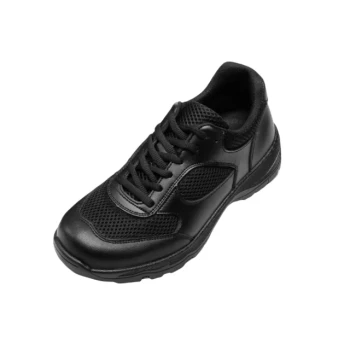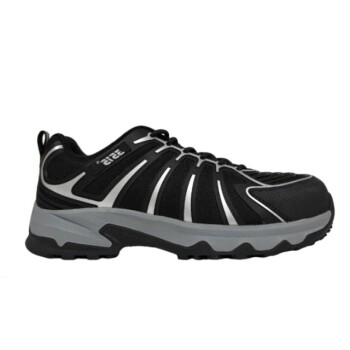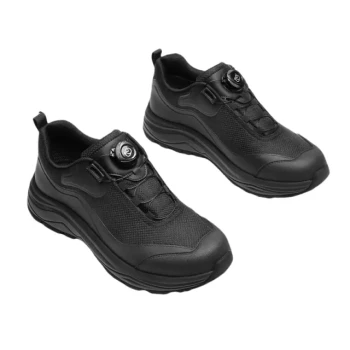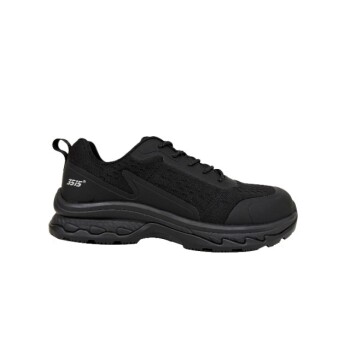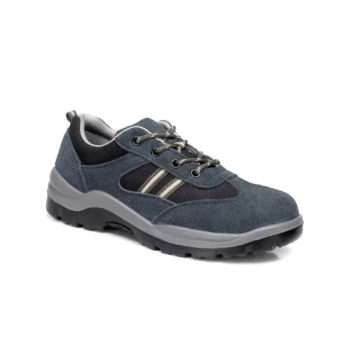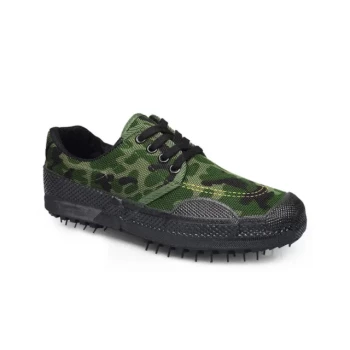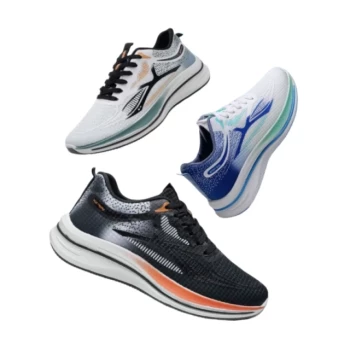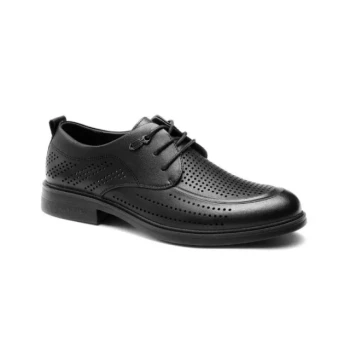Plantar fasciitis is rarely caused by a single issue, but rather by a combination of factors that collectively place excessive stress on the band of tissue supporting your foot's arch. The most common risk factors are being between the ages of 40 and 60, being overweight, having tight calf muscles, wearing unsupportive footwear, and spending long periods standing or walking, especially on hard surfaces.
Plantar fasciitis is fundamentally an issue of overuse and load management. The primary risk factors either increase the mechanical stress placed on the plantar fascia or reduce its capacity to absorb that stress effectively.
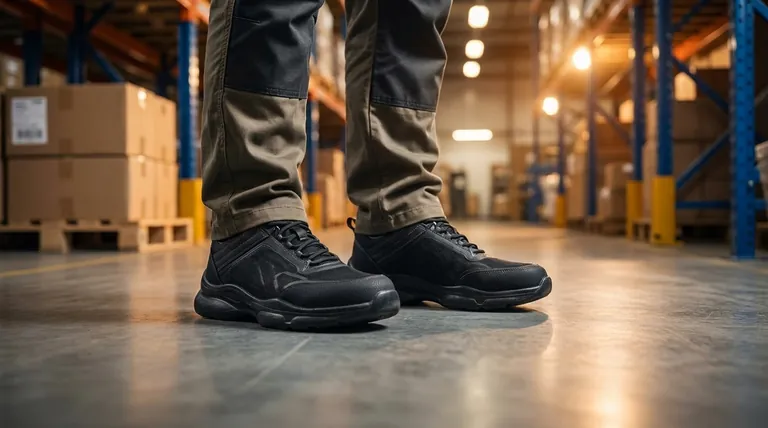
The Mechanics of Plantar Fascia Strain
The "Bowstring" Under Pressure
Think of the plantar fascia as a thick, fibrous bowstring connecting your heel to the front of your foot. Its primary job is to support your arch and absorb the shock of every step you take.
When Load Exceeds Capacity
Injury occurs when the cumulative load placed on this tissue exceeds its ability to repair itself. This isn't usually from one sudden event but from repetitive strain that causes micro-tears, inflammation, and pain.
Key Factors That Increase Load and Strain
Increased Body Weight
The link here is direct and mechanical. Every extra pound of body weight increases the force that the plantar fascia must absorb with each step, significantly raising the daily load on the tissue.
Prolonged Standing and Hard Surfaces
Jobs or activities that require long hours on your feet, particularly on unforgiving surfaces like concrete, create a high volume of repetitive strain. This environment doesn't allow the fascia adequate time to rest and recover between impacts.
Tight Calf and Achilles Tendon
This is a critical biomechanical factor. Tightness in your calf muscles (gastrocnemius and soleus) pulls on your Achilles tendon, which in turn pulls on your heel bone. This creates constant tension on the plantar fascia, even when you're not moving.
Poorly Supportive Footwear
Shoes with flimsy soles or inadequate arch support force the plantar fascia to work harder to maintain the foot's structure. This leads to muscle fatigue and directly overloads the tissue.
Understanding the Vulnerabilities
The Role of Age (40-60)
As we age, the tissues in our body, including the plantar fascia, naturally lose some of their elasticity and resilience. This reduction in flexibility means the fascia can't stretch and absorb shock as efficiently, making it more susceptible to injury from stresses it previously handled.
The "Weekend Warrior" Effect
A sudden increase in the intensity or duration of physical activity can easily overwhelm a plantar fascia that isn't conditioned for the new load. This is common in people who start a new running program or ramp up their activity too quickly.
Faulty Foot Mechanics
Both flat feet (overpronation) and very high arches can alter the way your foot handles impact. These structural issues can cause an uneven distribution of weight and stress, concentrating the load on the plantar fascia and leading to irritation.
Mitigating Your Risk: A Proactive Approach
Understanding the why behind your risk allows you to take targeted, effective action.
- If your primary focus is preventing injury during activity: Prioritize proper footwear with good arch support and consistently work on stretching your calf muscles.
- If your primary focus is managing daily discomfort: Focus on maintaining a healthy weight to decrease daily load and avoid prolonged standing on hard surfaces where possible.
- If you are over 40 and increasing your activity level: Emphasize gradual progression in your training to allow your tissues time to adapt to new demands.
Understanding these factors empowers you to manage the load on your feet, not just react to the pain.
Summary Table:
| Risk Factor | How It Increases Strain |
|---|---|
| Age (40-60) | Tissues lose elasticity, reducing shock absorption. |
| Increased Body Weight | More force is placed on the fascia with each step. |
| Prolonged Standing on Hard Surfaces | Creates high-volume, repetitive strain without recovery time. |
| Tight Calf Muscles | Pulls on the heel bone, creating constant tension on the fascia. |
| Unsupportive Footwear | Forces the plantar fascia to work harder to support the arch. |
| Sudden Increase in Activity | Overwhelms the fascia if it's not conditioned for the new load. |
| Faulty Foot Mechanics (e.g., Flat Feet) | Causes uneven weight distribution, concentrating stress on the fascia. |
Are you a distributor, brand owner, or bulk client in need of high-quality, supportive footwear?
As a large-scale manufacturer, 3515 produces a comprehensive range of footwear designed to mitigate the risk factors for plantar fasciitis. Our production capabilities encompass all types of shoes and boots engineered with proper arch support, durable construction, and comfort for long hours on your feet.
Let us help you provide your customers with the footwear solutions they need. Contact our team today to discuss your manufacturing needs.
Visual Guide
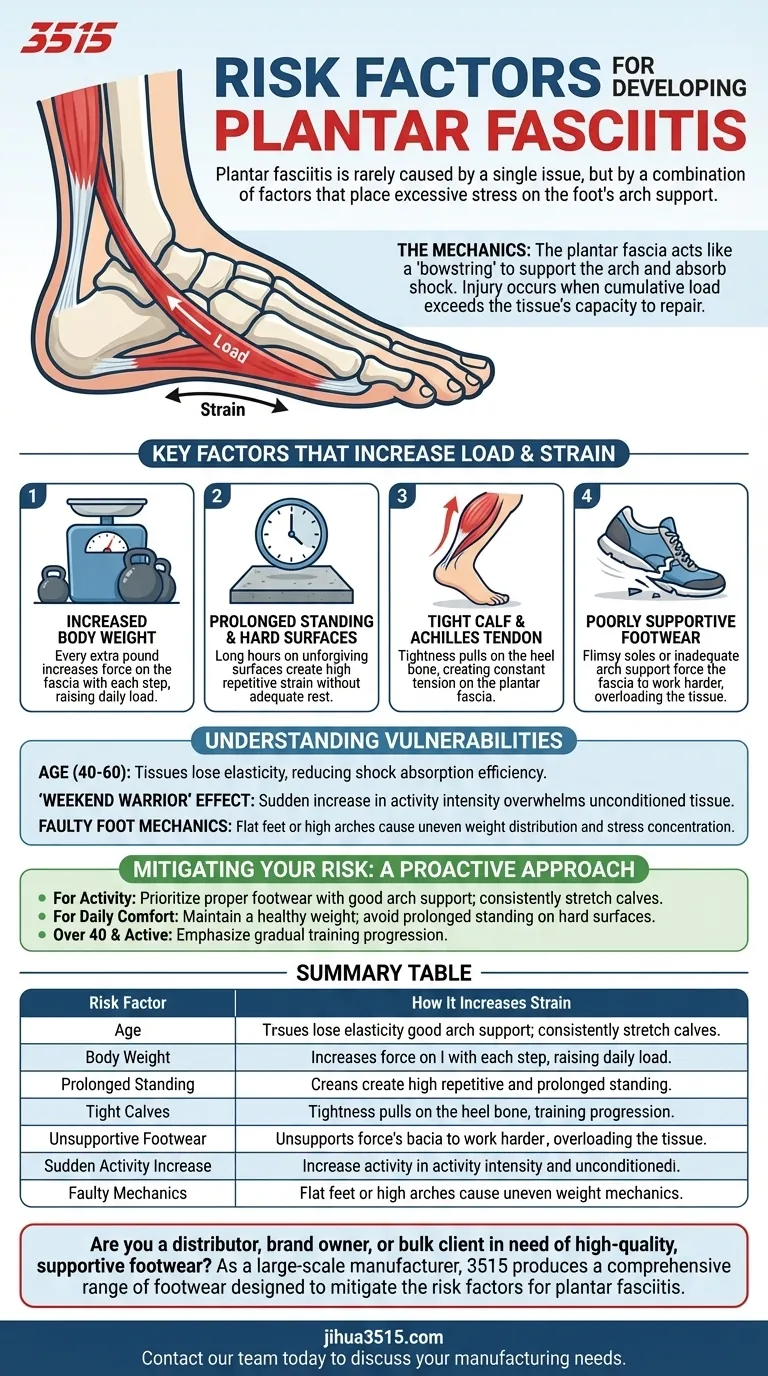
Related Products
- Wholesale Breathable Training Shoes Custom Athletic Footwear Manufacturer
- Lightweight Breathable Training Shoes for Wholesale & Custom OEM Manufacturing
- Wholesale Breathable & Cushioned Training Shoes Custom Factory Production
- Wholesale Durable & Breathable Training Shoes for Custom Brands
- Premium KPU Athletic Safety Shoes for Wholesale
People Also Ask
- Does more ground contact area mean better support? Unlock the Secrets of Stable Footwear
- Why are running shoes and walking shoes not interchangeable? Avoid Injury with the Right Footwear
- What are the benefits of athletic-style work shoes? Boost Comfort and Safety for Your Team
- How do athletic shoes with non-slip features differ from regular ones? Discover the Grip Advantage
- What are the characteristics of canvas as a shoe material? A Guide to Lightweight, Breathable Footwear
